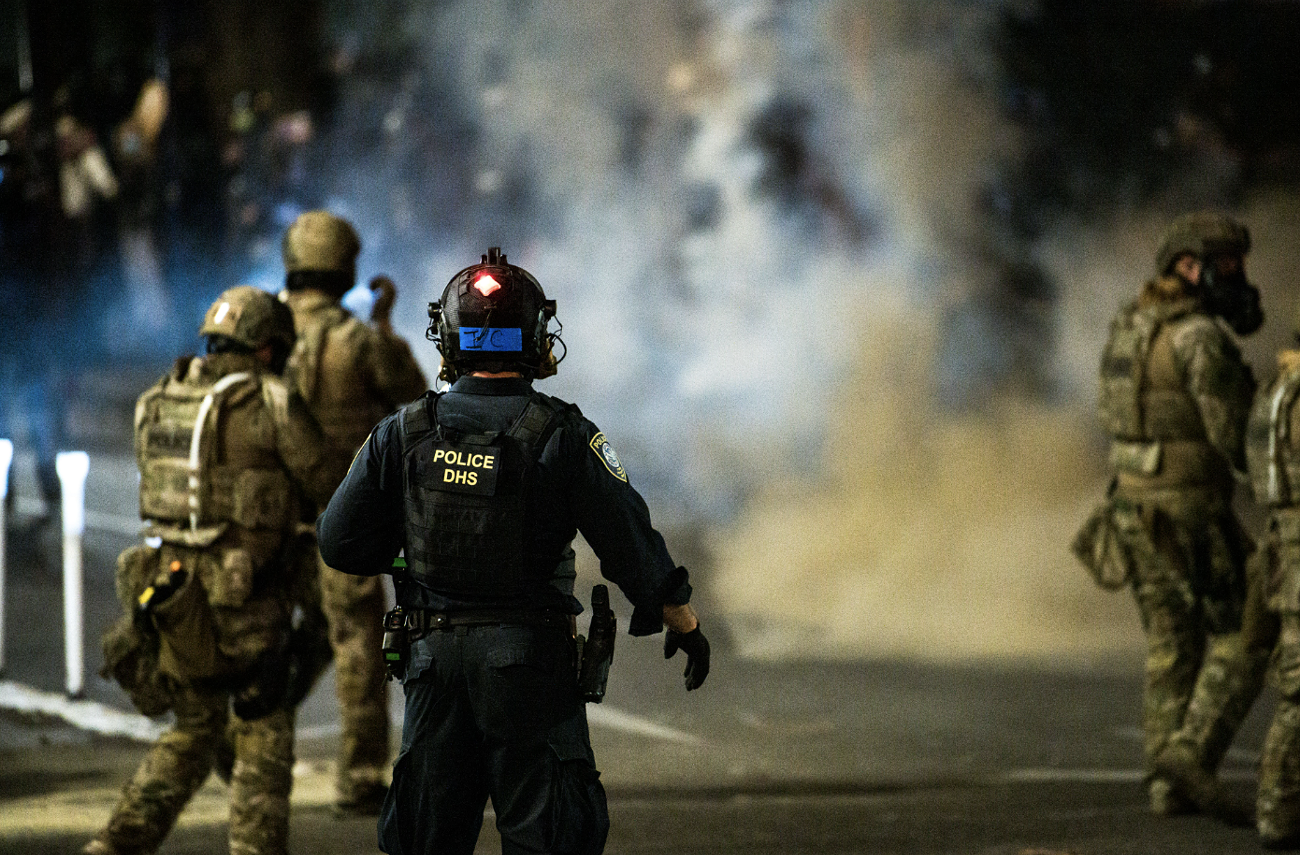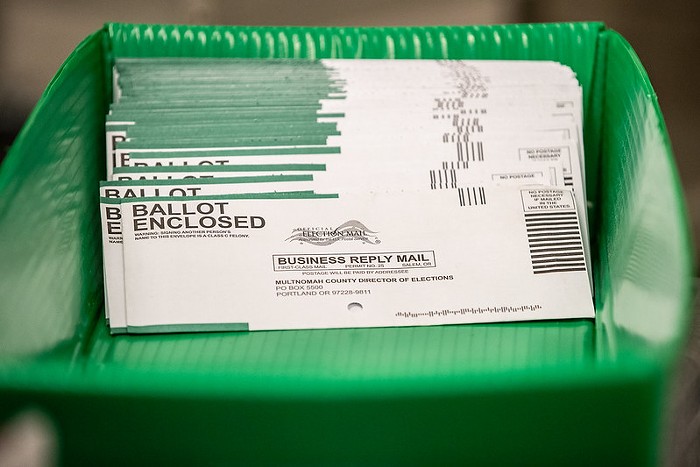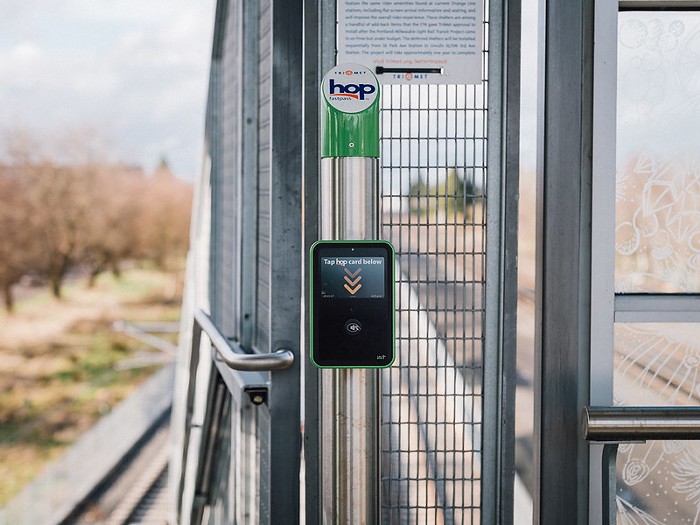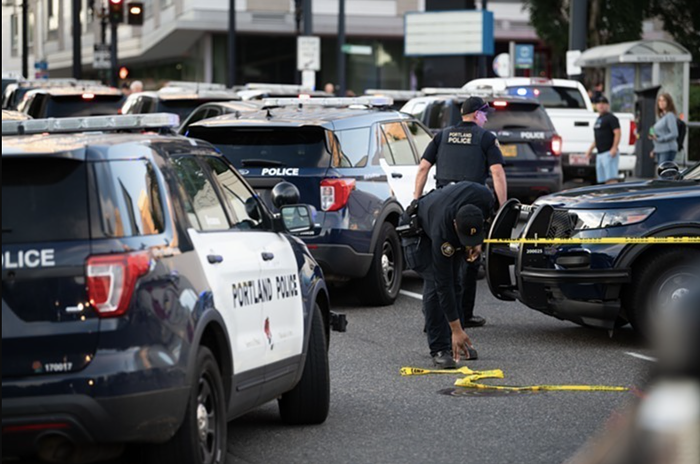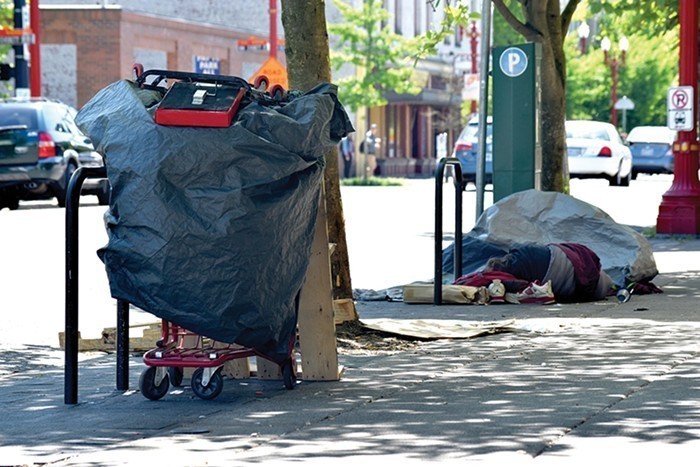While protesting for racial justice in downtown Portland in summer 2020, Brenna Bell was regularly exposed to both pepper spray and tear gas fired into crowds of demonstrators by law enforcement officers. But one of her most memorable experiences was getting tear-gassed not by a police officer, but by a tree.
“I was just standing [near the federal courthouse], without a gas mask or anything, and a wind came, and I was all of the sudden totally gassed,” Bell said. “There was this dense concentration [of gas] on the leaves of the tree.”
Bell’s young son had a similar experience not long after: he was standing with Bell’s partner in Chapman Square when a gust of wind stirred up chemicals from the soil at his face. Bell was alarmed by how officers had effectively weaponized the environment against those practicing free speech—and how little was known about the types of chemicals she and her family were inhaling.
Bell, who now works as an attorney with the environmental justice organization 350PDX, wasn’t the only person with these concerns. As Portland’s Black Lives Matter protests continued over the course of more than three months, both protesters and bystanders began reporting menstrual irregularities, increased anxiety, other mental health issues, and a growing concern that they didn’t know exactly what kind of chemicals they had been exposed to.
While empty canisters left behind at protests proved that both Portland police and federal officers with the US Department of Homeland Security (DHS) were using tear gas and other chemical weapons in the city, neither outfit was particularly forthcoming about what exact munitions they were dosing Portlanders with.
A federal law called National Environmental Policy Act (NEPA) requires the federal government to prepare and make public an environmental impact analysis every time it embarks on a major action that could have a significant impact on the human environment. As far as Bell could tell, DHS never did that when it launched “Operation Diligent Valor”—the Donald Trump-ordered action meant to quell protests in Portland.
In October of 2020, a collection of environmental organizations including 350PDX, Cascadia Wildlands, Willamette Riverkeeper, Neighbors for Clean Air, and the Northwest Center for Alternatives to Pesticides filed a complaint for declaratory and injunctive relief in US District Court, alleging that DHS violated NEPA and the Administrative Procedure Act, which governs the way in which federal agencies carry out rules.
The groups got a boost when the American Civil Liberties Union of Oregon (ACLU) decided to take the case on. It was the first time that the group had participated in an environmental lawsuit.
“[NEPA] very explicitly places people and the environment in a relationship together, and I think it’s important to remember that this case comes out of a significant protest movement in Portland,” said Kelly Simon, legal director of the ACLU of Oregon. “Protest is a right—not a privilege just for some people who may have the physical fortitude to withstand incredibly harmful weaponry yielded by the government.”
The proponents of the suit hoped to force the federal government to do what its proponents believe it should have done at the outset: fully account for the damage done by the chemical weapons used in Operation Diligent Valor and make that information accessible to the public.
But the case faced immediate pushback. DHS challenged the complaint on the basis that, because Operation Diligent Valor was winding down by the time the complaint was filed in October, there was nothing the court could do to provide relief to the complainants.
A judge last year agreed with DHS and dismissed the suit. But the complainants appealed to the Ninth Circuit Court of Appeals—arguing that even though the operation has concluded, people in Portland still stand to gain from DHS completing an environmental impact analysis.
“Anyone who’s been poisoned always wants to know what they were poisoned with in case there’s going to be long-term health implications or things they can do to mitigate the exposure,” Bell said.
DHS did not respond to a request for comment on this story.
Bell and a government attorney argued their cases before the Ninth Circuit on October 7. If the Ninth Circuit rules in favor of the complainants, the case will return to the US District Court. There is no set timeline for when the Ninth Circuit will issue its ruling.
For people affected by the federal government’s use of chemical weapons in Portland in 2020—either directly or indirectly through the presence of those chemicals in the community—the stakes of the complaint are high. Other groups and officials, including Oregon Senator Ron Wyden, have previously attempted to get a complete list of the chemical munitions used in Portland without success.
Dr. Juniper Simonis, a biologist and founder of data analysis company DAPPER Stats, has independently studied the chemical munitions used in Portland in 2020 and said that they are unaware of any other legal challenges that could potentially lead to the government disclosing the full range of the weapons it used in the city and studying their effects.
“There aren’t a lot of other things that could have this level of a change,” Simonis said of the complaint.
Simonis pointed to the conditions at South Portland’s Cottonwood School of Civics and Science, where the schoolyard enveloped in clouds of tear gas during 2020 protests, as one of the reasons why the city needs to learn more about the effects of the chemical weapons used in 2020.
The frustration for Bell and others is that DHS didn't just come to Portland and deploy copious amounts of chemical weapons in the summer of 2020, but that after the protests died down, the department seemingly took no responsibility for the damage it caused.
“No one was thinking about NEPA [in the summer of 2020],” Bell said. “I can almost guarantee you no one in DHS had that hat on in thinking about it. But their manual has emergency procedures in it that say, in the case of an emergency when you can’t do an analysis before an action, do it as soon as possible or concurrent with an action… in this case, it’s two years later and they still haven’t done it.”
Simon with the ACLU said that the change in presidential administration and Department of Justice leadership in 2021 did not alter the government’s position: they continue to argue in court that the environmental impact of the response to the 2020 protests is a moot point.
Simon doesn’t agree.
“People who don’t live and work in the Oregon community don’t realize that we’re still experiencing the impacts of the assault that we underwent, repeatedly, in 2020,” Simon said. “The harms are still incredibly present for us.”
